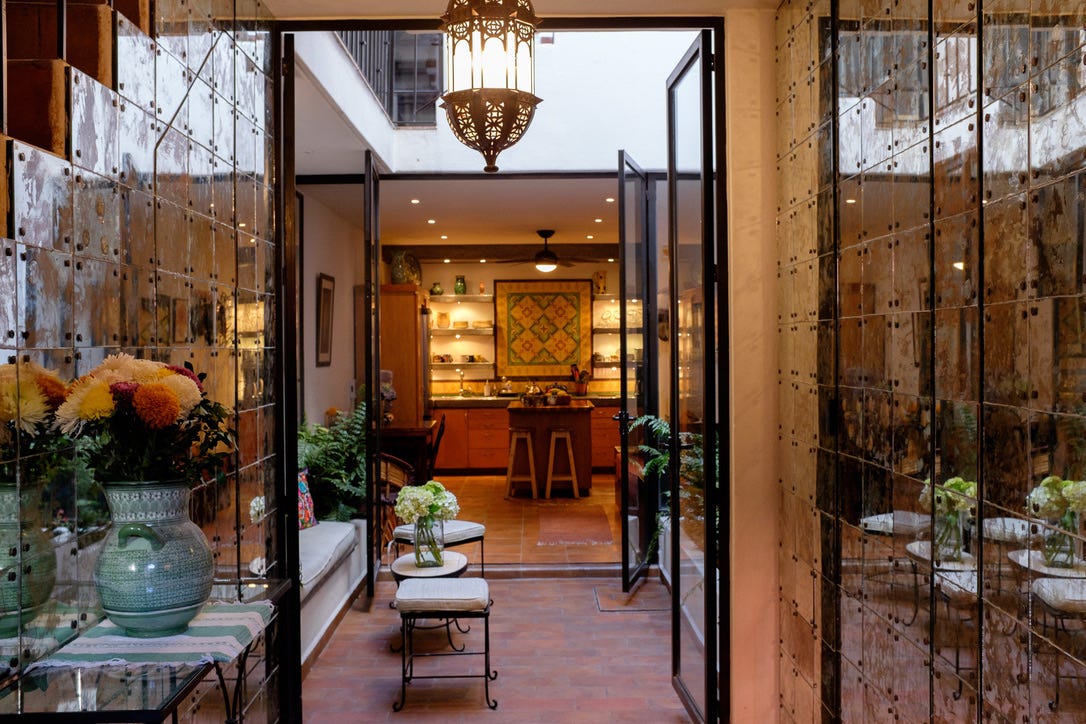In 2007, I was down in San Miguel de Allende, Mexico, writing a magazine story on women reinventing their lives in that town. Little did I know I would become one of them. I had lived in the colonial town for a summer when I was 10, when many of the streets were dirt, there were only a few cars (mostly VW bugs), and young men and women still strolled around the central jardin square on Sundays to catch each others’ eyes.
My sisters and I were enchanted by the place—the big cartoonish pink cathedral, the blue-fronted bakery, the street vendors, the artisan market, the secret gardens behind plain doorways. The town has a history as an artists’ enclave, every since after World War II, when people could attend one of the art schools there on the GI bill and live like kings. We went to art classes, took Spanish, and wandered all the cobblestone streets on our own.
San Miguel de Allende has had a big increase in Airbnbs in the 15 years since I’ve had my house there, especially since VRBO pulled out of the market.
When I returned, years later, I was afraid that everything would be changed and spoiled. It was changed, but it was still charming. It still had that sense of wonder and magic that I had felt as a kid. On that trip, I impulsively bought a run-down house in the historic Centro, one that was basically a garbage dump with a facade, and was only three meters wide. Everyone thought I was crazy. I got money for the deposit from the ATM, and by the end of the week, I’d signed a contract for the rest.
The house I bought in San Miguel de Allende in 2007 had been abandoned for 25 years.
I’m a renter in San Francisco, and I’ve always loved Latin countries, so it seemed like a good place to call my own, maybe even live full-time. Over the next year, I found a wonderful architect, a young Mexican woman named Anja Fauske, who turned the narrow dump into a "jewelbox,” which is what she promised me when she first saw the lot. We had a wonderful collaboration, and remain friends.
The interior of Casita Laurita—after
Since that time, I’ve spent about a quarter of my time down there. Not long after I bought it, I got involved with the man who became my husband, who can’t travel often. When I’m not in Mexico, I’ve rented it out. Initially I did that on VRBO, which pulled out when local, state, and federal taxes became too difficult to manage. When I first started renting it out, Airbnb didn’t exist. When VRBO pulled out, there was no alternative.
Renting the place out has never been a big source of income, and over the years, a lot of costs of running it have increased. I pay my housekeeper, administrator, and gardener well—their costs of living have increased with the greater numbers of foreigners in their town. But mainly, Airbnb fees have increased from a small percentage to whopping fees for myself and for the person booking. At the same time, not only have local taxes increased—I’m happy to pay my fair share, and have always complied—but the city has imposed a big fee on short-term rentals, mainly to help out the mayor’s friends, who are the big hoteliers. So now extra costs are about 30% over the nightly rate, which makes the houses seem a lot more expensive to renters, even though I haven’t raised the nightly rate for over ten years. I’m not losing money, but the margins are thin, especially for the hassle factor of complying with a lot of bureaucracy and hiring an accountant to report income to the feds every month.
But that’s not the reason I’m taking the house off AirBnB, as well as the house next-door I bought right before the pandemic (I knew the owners, and we were thinking that someday we might combine the houses to live there).
I took the houses off AirBnB because one of the billionaire co-founders, Joe Gebbia, is not only a Trump supporter and buddy of Elon Musk (though he used to be a Democratic donor), he has joined DOGE, apparently to “streamline” federal retirement payments. He told the New York Times he was bringing his “designer brain and start-up spirit” to DOGE to improve the retirement payment process. (Maybe that’s one of the reasons friends in San Miguel de Allende say they suddenly have not been receiving their social security checks).
Since that story broke, Airbnb has been deluged with negative comments from hosts and guests. People are canceling visits, and long-time “superhosts” like me are stepping away. Airbnb made a statement that Gebbia was joining DOGE in a “personal capacity” and that his “personal views don’t reflect the views of Airbnb.” Gebbia stepped down from daily operations of Airbnb in 2022, but he is still on the board. He’s also on the board of Tesla.
Meanwhile, Musk has praised Airbnb CEO Brian Chesky for his posts on X.
I just don’t want to be any part of any of this—and I don’t have to be. I will lose money, but I’m not giving my money to some right-wing fascists who are doing their best to destroy our democracy.
There’s also the issue that in many cities, Airbnb has driven up prices so high that locals move out, creating a kind of ghost town, and effectively destroying the culture of the city. Often these Airbnbs are run by corporations who buy the properties for the sole use of short-term rentals—different from the person with a part-time vacation home who rents it out occasionally, in my view. I’ve also, over the years, made a lot of effort to be a part of the community, supporting my neighbors in various ways, speaking Spanish, knowing their names, contributing to and attending street events. I’ve been a part of my block for 15 years, and everyone knows me.
When I mentioned that I was pulling my houses off Airbnb on a Facebook site for people in San Miguel de Allende (ironically called the “Civil List,” since it is often anything but), I got a lot of people asking me why I would quite Airbnb but not Facebook. Rebecca Solnit has pointed out that if you don’t give money to Facebook—if you don’t click on their ads, don’t buy anything—you’re interacting with a community that you and the others in it created, for free. It’s hard to completely wash yourself of every fucked-up billionaire in this country.
More helpfully, someone posted some of the alternatives out there to
Airbnb. I’m hoping to do more house trades, and either rent privately or try out some of these alternative sites.
There’s another issue, which is that I’m upset about all the damage the US is doing to Mexico with tariffs. Mexican President Claudia Sheinbaum has walked the fine line between standing up to Trump and cooperating as much as possible. She has arrested fentanyl producers in Sinaloa (who are mainly making products for the US market), given the US two dozen alleged cartel heads to prosecute in the US, sent troops to the border to help with the immigration problem, and repeatedly asked for cooperation. In return, Trump has doubled down on tariffs, imposing 25% on goods from Mexico (on March 6, with his typical lack of coherency, he said he’d wait until April).
That, of course, will increase the prices on a lot of the produce we buy—goodbye guacamole—as well as beer, tequila car parts, and lot of other products we get from Mexico. This is a tax on American consumers.
Worse, of course, is the effect it will have on Mexicans, putting the squeeze on businesses and the people who work for them, which will ultimately hit everyone in an already precarious economy. “There is no reason, justification or excuse that supports this decision that will affect our people and nations,” said Sheinbaum.
Disculpa, Mexico. You have been our friend, put up with drunken beachgoers and ugly Americans who shout in English and never say “gracias.” You deserve better.
In the meantime, I’ll do what I can to try to be a friend to Mexico and Mexicans, and resist Musk.
If you’re interested in renting one of my houses, check out CasasArtisticas.com. They’re both available after April 15.
Thanks to my cartoonist friend Lloyd Dangle for making this while he was staying at the Bird House.












Your places look wonderful. I will certainly consider renting if I visit your beautiful town!
I hear you loud and clear and agree wholeheartedly. Good luck!